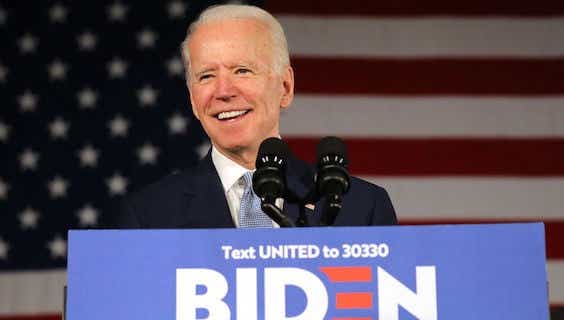The professor who correctly predicted President Trump’s rise weighs in on what Biden’s latest victory means for him going into Super Tuesday.
The results of the South Carolina primary are in and the winner is … former vice president Joe Biden. With 100 percent of precincts reporting, Biden garnered 48 percent of the vote. His closest competitor, Sen. Bernie Sanders, didn’t even come close, trailing the former vice president by nearly 30 points.
After finishing in a distant third in South Carolina, Tom Steyer ended his presidential bid late Saturday. The billionaire had poured millions of dollars of his own money to fund an advertising campaign in hopes of winning over the state’s large African American electorate. Buttigieg, meanwhile, announced the end of his campaign after a similarly disappointing showing in South Carolina.
To help decipher the impact of these results, Wake-Up Call’s senior writer Tess Bonn spoke to political historian Allan Lichtman, a professor at American University. Lichtman gained notoriety for developing a system that helped him correctly predict the last nine presidential elections, including that of President Trump.
Biden’s bet on South Carolina paid off… big time
Lichtman said Biden’s win not only put him back in the running for Democratic nomination — it also boiled the primary down to a two-person race between the former vice president and Sanders. “The most the other candidates can hope for is to scoop up delegates but none of the other candidates are going to win big enough in Super Tuesday to join Biden and Sanders at the top of the race,” he said.
Sanders has some vulnerabilities
Despite two back-to-back victories, Lichtman said Sanders’s loss in South Carolina raises questions over his ability to win the support of a crucial constituency of the Democratic Party: Black voters. “Sanders not only lost, he lost big and in part that reflects his ability to win the African American vote,” he said.
However, Lichtman noted that California’s decision to move up its primary to March 3 could benefit Sanders, who is the front-runner in the state per the RealClearPolitics polling average. “Biden may have an edge in some of the smaller southern states with major African American components but Sanders may have an edge in California, which is more diverse and more heavily Latino,” he said.
There’s a possibility for a brokered convention
Lichtman said there are essentially three outcomes following the South Carolina primary: either Sanders wins, Biden wins or no one wins. “If the other candidates scoop up enough delegates on Super Tuesday and other contests — we could be seeing for the first time since 1952 a brokered convention,” he said.
Michael Bloomberg will face a moment of truth
Though Bloomberg made the debate stage in South Carolina, he won’t make his first appearance on ballots until Super Tuesday. But Lichtman said voters could have already soured on the former New York City mayor following his lackluster debate performances. “We know he spent a lot of money but the reality of Bloomberg seems to be not quite as appealing,” he said.
That said, Lichtman added that Bloomberg could still win enough delegates to make it difficult for either Sanders or Biden to win outright or to have a truly commanding lead among delegates.
And, lastly, fears about party divisions are ‘misplaced’
The path to the Democratic nomination might be rocky and that’s okay, according to Lichtman. The professor said anxieties over a hotly contested convention aren’t as important for the party that isn’t currently in the White House.
“The out party can squabble it wants, it has no impact on the outcome in November,” he said. “Look at the bitter struggle among Republicans in 2016 — dwarfing what’s even going on in the Democratic Party.”
His comments come after The New York Times reported that Democratic leaders have grown increasingly more concerned about Sanders actually winning the nomination and dozens of superdelegates have said they would not back the Vermont senator if he fell short of winning a majority of pledged delegates.
This originally appeared on Medium.com









